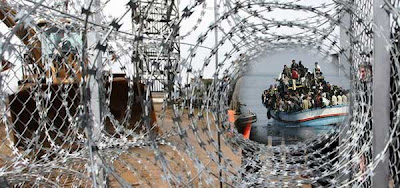As a fence to curb illegal immigration from Turkey to Greece
By Andy Dabilis and Menekse Tokyay for Southeast
European Times in Athens and Istanbul
|
A Greek Coast Guard vessel patrols at the maritime
border between
|
The timing illustrated the plight of immigrants trying to get into the EU through its southernmost member state as
Greek authorities hope that the 4-metre tall barbed-wire fence along the
Nearly 100,000 immigrants were arrested while trying to cross from
Tens of thousands of undocumented immigrants used to cross into
While the fence, even during its construction, cut arrivals of illegal immigrants by land down by 95 percent, they have turned in increasing numbers to the sea and the Greek islands of the
In the first seven months of 2012, police and coast guard officers on the islands said they detained 102 undocumented migrants while 1,536 were caught in the following three months.
Ioannis N. Grigoriadis, a political scientist from
"On the other hand, I consider Greek concerns about
In addition to hosting nearly 180,000 registered and unregistered Syrian refugees,
Unable to attain refugee or asylum status in
Instead, most make the crossing to
An estimated 55,000 illegal migrants sneaked into Evros prefecture from neighbouring
Stratos Georgoulas, a sociology professor at the University of the Aegean on Lesbos, told SETimes the fence won’t deter immigrants from getting into
"Every day for the last six months more than 20 people have been crossing the sea borders. If they don't drown, they stay in places here without any help from the Greek government. Many of us try to give them clothes," he said.
Many, he added, are asylum seekers coming to a country where as few as one in 10,000 applicants are granted that status and as a number of organisations -- now including Amnesty International, which criticised the ongoing sweep of immigrants and the conditions in which many are held -- have blasted Greece's immigrant policy.
"
"Against a backdrop of sustained migratory pressure, profound economic crisis and rising xenophobic sentiment,
Exacerbating
Amnesty, however, said other European countries share "responsibility for processing asylum applications and supporting asylum seekers more equally among member states." The organisation said that in some cases, Greek authorities were also pushing back migrants crossing from
Ketty Kehayioylou, the information officer for UNHCR's
"
Turkish authorities had no official comment on the fence's completion, but nearly a year ago Turkey Prime Minister Recep Tayyip Erdogan downplayed the wall's political significance.
"It's wrong to see this as a wall; it's just a barrier. We fully trust each other," he said.
Piril Ercoban, director of the Turkish pro-refugee Solidarity With Refugees Association, said a fence isn't a solution for people willing to escape from poverty and cruelty in their home countries.
"If obstacles are built, if fences are constructed, other ways can be found," Ercoban told SETimes. "As long as people feel the need to escape, they will find more expensive and risky solutions."
The fence, she said, will just push illegal immigration to other destinations, such as the
This content was commissioned for SETimes.com.
02/01/2013
http://www.setimes.com/cocoon/setimes/xhtml/en_GB/features/setimes/features/2013/01/02/feature-04

